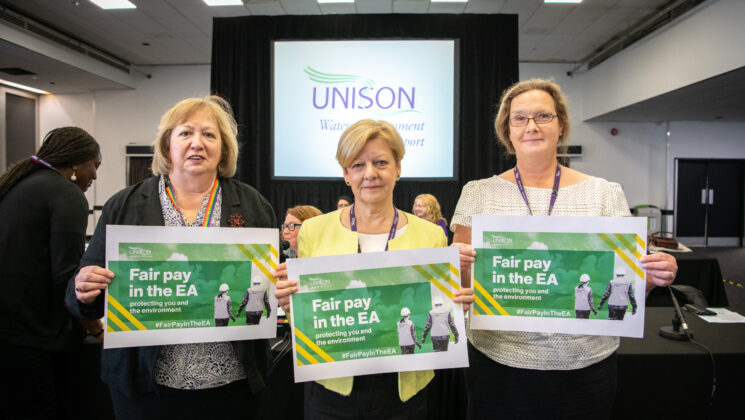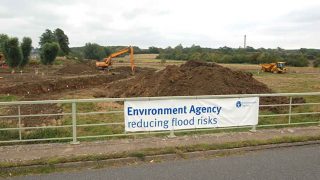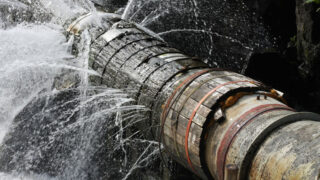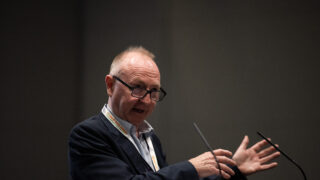UNISON held its annual water, environment and transport (WET) conference yesterday in Brighton. After a welcome from chair of the WET service group executive Ruth Davies (above, right), general secretary Christina McAnea (above, left) addressed conference, hailing the crucial work of workers in the sector over the pandemic.
She said it was only right that UNISON’s WET members be rewarded after a period in which they were relied on so heavily, adding, “When we argue for decent pay for our WET members, we’re also arguing for decent pay for the work and the services you provide, and if we can’t provide that then more than just you [WET members] suffer, society suffers.”
Continuing, she highlighted the inadequacy of the, “ad-hoc, off-the-cuff policies rolled out because there’s been a bad headline the day before,” and criticised the government for perpetuating the myth that paying public sector workers more will drive up inflation.
In stark contrast to the government, she said: “Every time I watch the news and I see there’s been an environmental disaster, a terrible flood or a storm. I know that it’s our members who are responding to it. You don’t run away from a crisis, you run towards a crisis”.
Following Ms McAnea, guest speaker Maggie Jones, Baroness of Whitchurch and Labour peer (above, centre) spoke. Having worked for UNISON and its predecessor NUPE for 30 years and still a member of the union, she told conference that she “holds UNISON very fondly in her heart”.
Outlining some of Labour’s priorities in the sector she said: “We recognise we are in a decisive decade in the fight against environmental breakdown,” adding: “The environment agencies are the cornerstone of our green programme”.
Speaking of issues with sewage contamination of waterways, Baroness Whitchurch said that, in power, Labour would bring forward a “clean water bill to clean up our rivers and waterways once and for all”.
On transport she highlighted the “decade of deregulation and decline” the country has experienced and said Labour would work for “better, cleaner transport, run in the public interest”.
In conclusion, the baroness said: “Green jobs and innovation will be at the heart of everything we [Labour] do. And your sectors, environment, water and transport will be at the heart of it as well.”
Environment Agency pay
After the speeches, UNISON vice president Kath Owen – chairing conference – introduced the business of the day. Delegates carried a wide range of motions, spanning bargaining and campaigning across each of the three sectors: water, environment and transport.
Motion six “Fair pay in the EA”, submitted by the WET SGE, called on the executive to increase the pressure on the Environment Agency (EA) to demand adequate funding from DEFRA and to challenge the government’s damaging pay policy.
Jackie Haymer, moving the motion, cited the fact that, “in more than 12 years, only once have EA workers had a pay rise that kept pace with inflation. Every other year, we either had a rise that fell far short, or was no rise at all.
“If the current 2% guidance is applied, were going to see a record gap between pay and the cost of living.” Asking “How are they [EA workers] meant to cope with what could be a 7% pay cut in real terms?”
Hybrid working
Also on bargaining and negotiating, motion one dealt with hybrid working where it was warned that such arrangements haven’t been extended to all UNISON members equally and are at risk of creating a three-tier workforce.
Motion four called on the SGE to work with Labour Link to lobby the UK government to promote STEM subjects to girls in school to increase the number of women working in technical roles in WET and to make closing the gender pay gap a priority in bargaining strategies.
Dumping of sewage into watercourses
In the session on campaigning motions, conference heard passionate speeches on the issue of water companies dumping sewage into watercourses.
Mover of motion seven, Irena Davis of United Utilities branch, said: “The water companies continue to increase their profits while causing catastrophic damage to our rivers and eco systems. Meanwhile huge dividends are paid out to shareholders and huge pay packets to CEOs.”
She compared the situation in England with that in Scotland where Scottish Water is publicly owned and has invested about 35% more per person in their water infrastructure.
Mental health
Motion 12 dealt with the mental health of key workers in the water industry and Martin Bentley spoke of his personal experience of the issue, speaking for the motion.
He said: “I fix computers for a living. But during the pandemic I ended up fixing people too.” He spoke about how he “was giving mental health support accidentally” when people rang to sort out their tech issues while working from home.
The motion, which was carried, recognised that “mental health is a workplace issue which must be addressed by trade unions, both in negotiations with employers and by direct support for affected workers.”
Flood defences
Joe Mitchell branch secretary for East Midlands internal drainage board branch, warned conference that leaving flood defences in private ownership was a disaster waiting to happen.
He said that “A third of England’s vital flood defences are in private hands, around 1,000 have been found to be in a poor state and at risk of complete failure,” and cited the fact that private owners cannot be forced to carry out maintenance, only encouraged as a cause for real concern.
The motion called for a campaign to take these defences into public ownership to ensure there are clear responsibilities and adequate measures in place to keep defences properly maintained and inspected.






